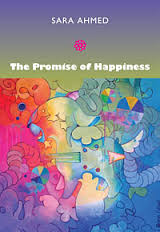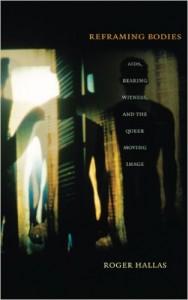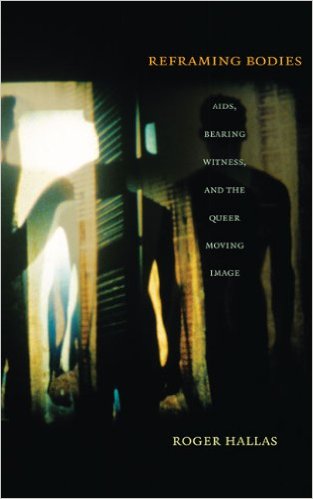 The Promise of Happiness
The Promise of Happiness
by Sara Ahmed
Duke. 315 pages, $23.95 (paper)
In The Promise of Happiness, Sara Ahmed offers a critique of our culture’s imperative to be happy. Drawing on source material that ranges from Aristotelian discussions of ethics to the film Bend It Like Beckham, Ahmed explores what happens when our own happiness is conditional on someone else’s, and the life choices we make in response to that perceived obligation. If “I just want you to be happy,” to what exactly am I committing myself? Ahmed is professor of race and culture studies at the University of London, and The Promise of Happiness reads very much as a product of academia. There are instances when a citation gets wrapped in a page reference and topped with a footnote in a sort of algebraic spring roll, and those footnotes are numerous and extensive. But Ahmed’s analyses are spot-on and provocative. In Bend It Like Beckham, for example, one girl’s love of football becomes central to her identity within her traditional Indian family and their home in England. Does becoming more assimilated (whiter?) equal happiness? Her family won’t let her play, so she defies them to play in secret; her friend on the team, who is white, is pressured to give up football for something more feminine (straighter?). Ahmed’s analysis of this and other topics is unpredictable and engaging.
by Heather Seggel
 Reframing Bodies: AIDS, Bearing
Reframing Bodies: AIDS, Bearing
Witness, and the Queer Moving Image
by Roger Hallas
Duke. 366 pages, $24.95 (paper)
This book presents an original and intriguing re-evaluation of queer film and videos made between the mid-1980’s and the early 2000’s in response to the aids epidemic. Terming this work “queer aids media,” Hallas explores how artists used film and video to “bear witness to the historical trauma of the epidemic.” In so doing, Reframing Bodies expands our understanding of the political importance of visual media to the act of witnessing and the ongoing efforts of aids activism. This is a scholarly book that brings to the growing bookshelf of trauma studies an engaging analysis of the work of queer media, and in turn expands the conversation on the history and experience of trauma to include queer experiences of aids. While much has been said about representations of the epidemic, Reframing Bodies shifts our attention to alternative visual media that redefined and challenged mainstream media images. Though the book at times is directed to an academic audience, it offers a lively and impassioned interpretations of the films, and calls our attention to an archive of creative and innovative work that deserves to be remembered and reconsidered.
by James Polchin






